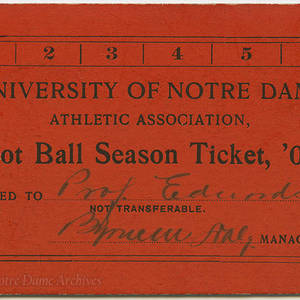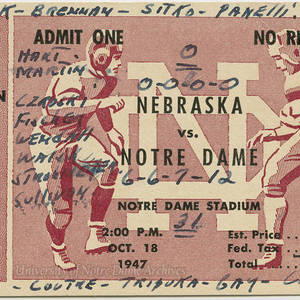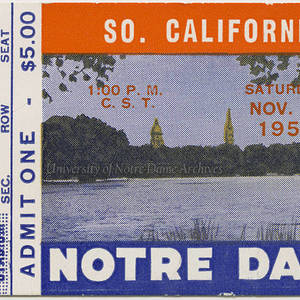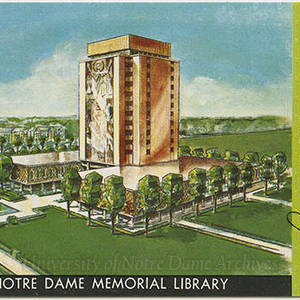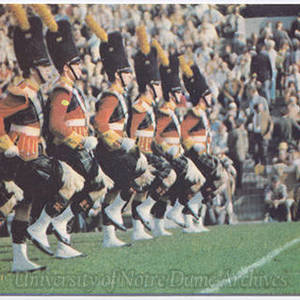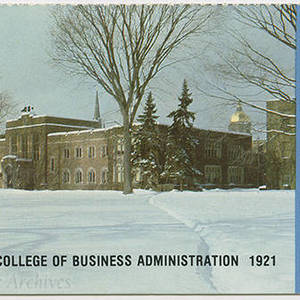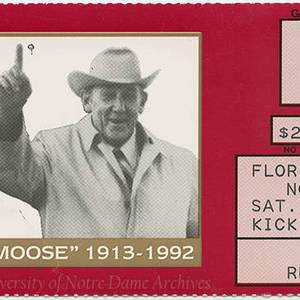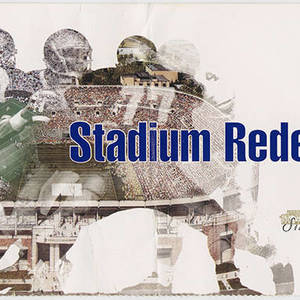Notre Dame football tickets on paper, those game day mementos stored away in shoeboxes — and sometimes sold decades later on eBay — are no more.
Beginning this fall, the University is shifting to mobile-only ticketing for all sports events. Game tickets — as well as football-season parking passes — will be distributed through a smartphone app.
The change, which had been in the planning for several years, was accelerated by the coronavirus pandemic and the need for a contactless way to distribute tickets, says Brian Pracht, associate athletics director for marketing and ticketing.
Student football tickets have been mobile-only since 2014. Last fall, because of the pandemic, only students and a limited number of faculty and staff were permitted to attend home football games, and for the first time employee tickets were issued mobile-only. “We were really pleased with the results. It was pretty seamless,” Pracht says.
Mobile ticketing offers protection against fraud and will reduce the problem of lost, forgotten or stolen tickets, he says. Each year brings some cases of counterfeit or stolen tickets, mainly at the bigger games. Much more common, Pracht says, are ordinary fans who forget their tickets at home or leave them in a vehicle or a hotel room. “The good thing about this is, as long as you have your phone with you, you have your tickets as well,” he says.
An individual must create a Notre Dame athletics ticket account at nd.com/buytickets in order to purchase tickets and use the mobile ticketing option. (Those who have previously purchased tickets from Notre Dame already have an account.)
Under the new system, fans will not be able to print out their tickets at home. The University will encourage those who don’t own smartphones to transfer their tickets electronically to a person with whom they plan to attend the game. That second person must have a Notre Dame ticket account or create one during the transfer process. Ticket resolution booths at the stadium gates will help ticket holders resolve technical problems.
Mobile ticketing is common at pro sports events, and many universities with major athletic programs have already made the switch to mobile tickets. Clemson, Alabama, Boston College and Oklahoma, among others, shifted to mobile-only tickets in 2020. Pracht estimates about 90 percent of Notre Dame’s peer institutions will rely exclusively on electronic tickets by this fall.
The shift to mobile saves the University time and the cost of printing and mailing tickets. Under the old system, which began with the general alumni lottery in late spring, the vendor needed six to eight weeks to print, barcode and mail the tickets. Now, “we don’t have this looming print deadline to hit,” Pracht says.
With the switch to mobile, this year’s general alumni football ticket lottery will take place in July. All tickets purchased will be delivered — electronically — shortly before the first game.
Amid declining COVID-19 case numbers, and after consulting with local health officials, the University announced plans to restore full capacity in Notre Dame Stadium — all 77,622 seats — for the 2021 football season. Traditional football weekend events are also expected to resume, including tailgating and the player walk.
Pracht says University officials realize some fans may be apprehensive about the switch to mobile ticketing and have questions. His office will provide step-by-step instructions about how to download tickets as the time for purchasing approaches.
Fans will be able purchase keepsake commemorative tickets, both in single-game and season-ticket form. Prices haven’t yet been announced.
Printed football tickets, many with creative designs, go back nearly to the first Notre Dame football game — a contest at home against the University of Michigan in November 1887. Two years later, on September 28, 1889, The Notre Dame Scholastic reported: “The base-ball and football season tickets are very artistic — buy one and see.”
The campus ticket office opened in 1921, when the University appointed Al Ryan as the first ticket manager. Before then, head football coach and athletic director Knute Rockne handled all ticket sales and distribution.
Alumni from the 1980s and ’90s will remember the tradition of camping overnight outside the Joyce Center in order to be among the first in line to purchase football tickets and have a shot at seats near the 50-yard-line. Students had to fill out an application form to buy their tickets.
Administrative concerns about safety, litter and alcohol consumption put an end to that custom in 1999, when the University shifted to a lottery system for student ticket assignments, eliminating any need to be near the front of the line. The shift to digital student tickets 15 years later eliminated the line entirely.
Margaret Fosmoe is an associate editor of this magazine.
